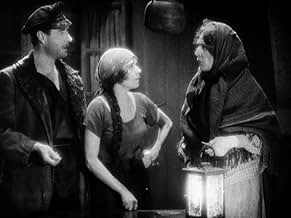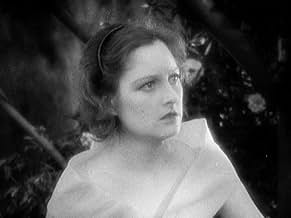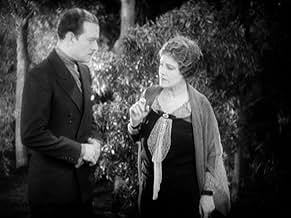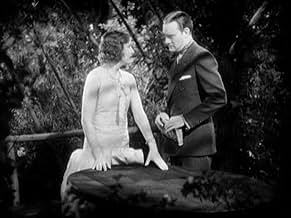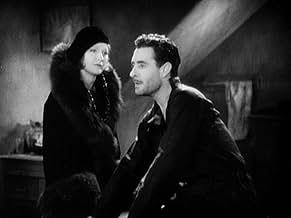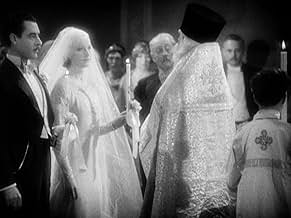Fedya wins Lisa away from her fiance, Victor Karenin. But after Fedya weds Lisa, he becomes infatuated with a gypsy girl, Masha. His duplicity leads to tragedy.Fedya wins Lisa away from her fiance, Victor Karenin. But after Fedya weds Lisa, he becomes infatuated with a gypsy girl, Masha. His duplicity leads to tragedy.Fedya wins Lisa away from her fiance, Victor Karenin. But after Fedya weds Lisa, he becomes infatuated with a gypsy girl, Masha. His duplicity leads to tragedy.
- Awards
- 1 win total
George Spelvin
- Magistrate
- (scenes deleted)
Richard Alexander
- Policeman
- (as Dick Alexander)
Charles Quatermaine
- Artimiev
- (scenes deleted)
Agostino Borgato
- Petushkov
- (scenes deleted)
Max Barwyn
- Trial Attendee
- (uncredited)
Stanley Blystone
- Undetermined Secondary Role
- (uncredited)
Geraldine Dvorak
- Anna Pavlovna's Maid
- (uncredited)
Featured reviews
An irresponsible gambler, having destroyed the happiness of those dearest to him, seeks REDEMPTION in suicide.
According to cinematic legend, all the talkie MGM films starring John Gilbert were dreadful - the result of a bitter hatred between Gilbert (the highest paid star in Hollywood, with a $1.5 million contract) & studio boss Louis B. Mayer. A determination on Gilbert's part to fulfill the contract, and a campaign instituted by Mayer to destroy Gilbert's career including spreading the rumor that Gilbert's voice was 'high & feminine', culminated in several unwatchable movies.
Not entirely true. The Studio had a huge financial investment in Jack Gilbert and was not going to completely cut its own throat by showcasing him in nothing but dreck. However, of the 8 MGM talkies in which he appeared as solo star (1929 - HIS GLORIOUS NIGHT; 1930 - REDEMPTION; WAY FOR A SAILOR; 1931 - GENTLEMAN'S FATE; THE PHANTOM OF Paris; WEST OF Broadway; 1932 - DOWNSTAIRS; 1933 - FAST WORKERS) most were certainly rather ghastly.
Although released after HIS GLORIOUS NIGHT, REDEMPTION was Gilbert's first foray into talking pictures. He hated the film and begged the Studio not to release it, fearful of what it might do to his career. But release it they did, and coming after the atrocious reception of HIS GLORIOUS NIGHT, Gilbert's career was struck a mortal blow.
One of the main problems with REDEMPTION, aside from the turgid dialogue and dreadful editing, is that it is a depressing story, with wretchedly unhappy characters. This may have worked fine in Tolstoy's original novel (The Living Corpse), but for the cinema, especially dealing with the new difficulties engendered by sound, a morbid story line was deadly. To make matters worse, Gilbert tended to deliver his lines in a sing-song manner, which made them sound silly. Only in the Easter Monday Night scene does he get a few moments to show what he was capable of artistically.
The rest of the cast, Conrad Nagel, Eleanor Boardman & Renée Adorée, are also defeated by the film, although they speak their lines more naturalistically than Gilbert. The existing print of the film seems about 10 minutes short and what appears to be missing, based on Gilbert's final lines, would be the death of Adorée's character. (Movie mavens will recognize, in an uncredited role, silent comic Mack Swain playing an unfriendly Russian judge.)
Finally, about The Voice. There was nothing at all strange or unnaturally high about Gilbert's voice. As a matter of fact, it was of medium range & rather cultured & refined. Which was the crux of the problem, of course. While it is possible that no voice could have ever matched the perfect one viewers heard in their minds while watching his strong, virile silent roles, the reality was very different from what they wanted to hear (imagine Robert Montgomery's voice coming out of Clark Gable's mouth.) Gilbert was doomed from his first scene in his debut talkie; his war with Mayer only intensified the agony. John Gilbert would die in 1936, forgotten by most of his former fans, at the age of only 36.
According to cinematic legend, all the talkie MGM films starring John Gilbert were dreadful - the result of a bitter hatred between Gilbert (the highest paid star in Hollywood, with a $1.5 million contract) & studio boss Louis B. Mayer. A determination on Gilbert's part to fulfill the contract, and a campaign instituted by Mayer to destroy Gilbert's career including spreading the rumor that Gilbert's voice was 'high & feminine', culminated in several unwatchable movies.
Not entirely true. The Studio had a huge financial investment in Jack Gilbert and was not going to completely cut its own throat by showcasing him in nothing but dreck. However, of the 8 MGM talkies in which he appeared as solo star (1929 - HIS GLORIOUS NIGHT; 1930 - REDEMPTION; WAY FOR A SAILOR; 1931 - GENTLEMAN'S FATE; THE PHANTOM OF Paris; WEST OF Broadway; 1932 - DOWNSTAIRS; 1933 - FAST WORKERS) most were certainly rather ghastly.
Although released after HIS GLORIOUS NIGHT, REDEMPTION was Gilbert's first foray into talking pictures. He hated the film and begged the Studio not to release it, fearful of what it might do to his career. But release it they did, and coming after the atrocious reception of HIS GLORIOUS NIGHT, Gilbert's career was struck a mortal blow.
One of the main problems with REDEMPTION, aside from the turgid dialogue and dreadful editing, is that it is a depressing story, with wretchedly unhappy characters. This may have worked fine in Tolstoy's original novel (The Living Corpse), but for the cinema, especially dealing with the new difficulties engendered by sound, a morbid story line was deadly. To make matters worse, Gilbert tended to deliver his lines in a sing-song manner, which made them sound silly. Only in the Easter Monday Night scene does he get a few moments to show what he was capable of artistically.
The rest of the cast, Conrad Nagel, Eleanor Boardman & Renée Adorée, are also defeated by the film, although they speak their lines more naturalistically than Gilbert. The existing print of the film seems about 10 minutes short and what appears to be missing, based on Gilbert's final lines, would be the death of Adorée's character. (Movie mavens will recognize, in an uncredited role, silent comic Mack Swain playing an unfriendly Russian judge.)
Finally, about The Voice. There was nothing at all strange or unnaturally high about Gilbert's voice. As a matter of fact, it was of medium range & rather cultured & refined. Which was the crux of the problem, of course. While it is possible that no voice could have ever matched the perfect one viewers heard in their minds while watching his strong, virile silent roles, the reality was very different from what they wanted to hear (imagine Robert Montgomery's voice coming out of Clark Gable's mouth.) Gilbert was doomed from his first scene in his debut talkie; his war with Mayer only intensified the agony. John Gilbert would die in 1936, forgotten by most of his former fans, at the age of only 36.
A good sound film for its time that should be absolutely fascinating to any silent-film buff. Look at the cast list and the director's name. This film positively teems with former silent-film *STARS* at the onset of sound productions.
Perhaps not surprisingly, I feel this film would have been better if produced silent. It certainly has the silent "look" and a silent "pace" to it.
While I think all the actors' voices sound good (even Gilbert's), their line deliveries are occasionally suspect--but not too bad.
All in all a decent (not excellent) early sound picture that should hold silent-film fans rapt till the end credits.
Perhaps not surprisingly, I feel this film would have been better if produced silent. It certainly has the silent "look" and a silent "pace" to it.
While I think all the actors' voices sound good (even Gilbert's), their line deliveries are occasionally suspect--but not too bad.
All in all a decent (not excellent) early sound picture that should hold silent-film fans rapt till the end credits.
In Russia, irresponsible John Gilbert (as Fedor aka Fedya Protasoff) becomes attracted to lovely Eleanor Boardman (as Lisa), but she is engaged to old school chum Conrad Nagel (as Victor Karenin). While they work out their sexual urges, Mr. Gilbert must also deal with an ongoing attraction to vagabond gypsies, especially alluring Renée Adorée (as Masha). Her parents steal a scene by picking Gilbert's pockets. Born to Ms. Boardman, an intriguing baby is seen only briefly. This early "talkie" was planned as Gilbert's first feature in the popular new medium; he reportedly detested the film, and release was delayed until after "His Glorious Night" (1929). "Redemption" looks like they could not get it right. This resulted in a second blow to Gilbert's film career.
*** Redemption (4/5/30) Fred Niblo ~ John Gilbert, Eleanor Boardman, Renee Adoree, Conrad Nagel
*** Redemption (4/5/30) Fred Niblo ~ John Gilbert, Eleanor Boardman, Renee Adoree, Conrad Nagel
John Gilbert's was in fine voice in Redemption, although the film itself was badly edited (particularly the opening scene of gypsies in a park) and more than a little morbid. It seems that MGM tries to undermine Gilbert by spreading negative rumors about his voice in hopes of getting out of their contract with them, which bound them to pay him ten (10) times per picture what he earned when Greta Garbo insisted that he be her co-star, after his MGM contract had ended, in 1933's Queen Christina.
And if anyone doubts that Louis B. Mayer had it in for Gilbert, just listen to the interview on this subject given years later by Hollywood Director King Vidor. And note that rather than putting both Garbo's and Gilbert's names above the title in Queen Christina, as had been done with their successful silent films, only Garbo was listed above the title. And their publicity for the film (eg its Posters) did not even list Gilbert among the cast.
In fact, Gilbert had a fine and interesting voice, which was perhaps too elegant and less casual than it might have been. His voice was deeper and more resonant than a number of the stars making their first sound films in 1929-30, eg. Douglas Fairbanks Sr. and Jr. and especially Charles Farrell, who truly had a high tenor voice, but nonetheless acted in Hollywood into the 1950s. Most comparable was Robert Montgomery's voice, which although a bit higher than Gilbert's was more casual.
Happily for us, John Gilbert made a total of 11 sound films and I particularly recommend The Phantom of Paris (1931), Downstairs (1932), Queen Christina (1933) and The Captain Hates the Sea (1934).
My main reasons for seeing 1930's 'Redemption' was for silent film star John Gilbert in the lead role, in his second talkie, and once again to see if his talkie films deserved the bad reputation they have as many felt and still feel that he didn't transition well from silent to talkie. His voice, as already said, also didn't have a good reputation, with many feeling that it didn't match their expectations of what he would sound like looking at him.
Watching his talkies overtime, my feeling is that, while one can see why the reputations of some of them are not great or even good not all of his talkies are bad. Actually liked 'Downstairs' a lot which also boasted one of Gilbert's best performances in my view, and 'Phantom of Paris' also had a good deal of good points despite completely falling apart in the last third. Do think as well that his personal problems and financial difficulties played a major part in his decline and hurt his strong reputation he had in silent pictures, an opinion also felt by a good deal of people now. 'Redemption' is his second talkie as said already, have not been able to find his talkie debut though 'His Glorious Night' (which seems like it is in obscurity), and to me it's one of his weakest talkies.
'Redemption' has its moments. It is well shot and designed, not looking too over-static.
Gilbert does his best with what he was given to work with, which was well below his abilities and not meaty at all, and compared to everything else he's pretty decent. The best and most genuine performance, with the only character that feels real, comes from Conrad Nagel.
The rest of the cast are not good at all, either being exaggerated or bland. They also evoke the strong feeling of not being bad at all in silent film but transitioning badly into talkies and being ill at ease in it. Have seen much better from Eleanor Boardman. The direction is similarly stiff and uncomfortable, it was Fred Niblo's first sound film and the inexperience and self-consciousness in sound shows.
Sadly that is not all. The story creaks badly and has an already old-fashioned feel, on top of being predictable and dull. The chemistry is static and the more romantic moments are more unintentionally funny than sweet. The script is too wordy and over-flowery, not to mention that it flows awkwardly throughout. Next to none of the characters ring true or feel like real people, the only genuine character is Nagel's.
Concluding, very mediocre at best and while the overall reputation of Gilbert's talkies was not that bad this was proof that it was not entirely undeserving. 4/10
Watching his talkies overtime, my feeling is that, while one can see why the reputations of some of them are not great or even good not all of his talkies are bad. Actually liked 'Downstairs' a lot which also boasted one of Gilbert's best performances in my view, and 'Phantom of Paris' also had a good deal of good points despite completely falling apart in the last third. Do think as well that his personal problems and financial difficulties played a major part in his decline and hurt his strong reputation he had in silent pictures, an opinion also felt by a good deal of people now. 'Redemption' is his second talkie as said already, have not been able to find his talkie debut though 'His Glorious Night' (which seems like it is in obscurity), and to me it's one of his weakest talkies.
'Redemption' has its moments. It is well shot and designed, not looking too over-static.
Gilbert does his best with what he was given to work with, which was well below his abilities and not meaty at all, and compared to everything else he's pretty decent. The best and most genuine performance, with the only character that feels real, comes from Conrad Nagel.
The rest of the cast are not good at all, either being exaggerated or bland. They also evoke the strong feeling of not being bad at all in silent film but transitioning badly into talkies and being ill at ease in it. Have seen much better from Eleanor Boardman. The direction is similarly stiff and uncomfortable, it was Fred Niblo's first sound film and the inexperience and self-consciousness in sound shows.
Sadly that is not all. The story creaks badly and has an already old-fashioned feel, on top of being predictable and dull. The chemistry is static and the more romantic moments are more unintentionally funny than sweet. The script is too wordy and over-flowery, not to mention that it flows awkwardly throughout. Next to none of the characters ring true or feel like real people, the only genuine character is Nagel's.
Concluding, very mediocre at best and while the overall reputation of Gilbert's talkies was not that bad this was proof that it was not entirely undeserving. 4/10
Did you know
- TriviaJohn Gilbert loathed the film and begged for it not to be released. His wishes were not granted. Instead the film was shelved and was released after Breath of Scandal (1929), which had been filmed after "Redemption" was already finished.
- ConnectionsFeatured in Hollywood (1980)
Details
- Release date
- Country of origin
- Languages
- Also known as
- S one strane života
- Filming locations
- Production company
- See more company credits at IMDbPro
- Runtime1 hour 15 minutes
- Color
- Sound mix
Contribute to this page
Suggest an edit or add missing content


